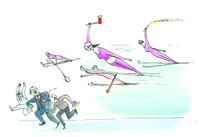 I’m glad the women ski jumpers can’t compete in the 2010 Olympics.
I’m glad the women ski jumpers can’t compete in the 2010 Olympics.
I must admit those aren’t exactly words I thought I would utter when I first heard about their plight. In July, the Hon. Lauri Ann Fenlon of the Supreme Court of British Columbia ended the women’s bid to compete in this February’s Olympics. But after reading her ruling in the matter of Sagen v. Vancouver Organizing Committee for the 2010 Olympic and Paralympic Winter Games, I found myself uttering that very thing.
In May 2008, 15 past and current female ski jumpers filed a lawsuit against the Vancouver Organizing Committee (VANOC) for excluding their sport from the XXI Winter Olympiad. They argued that their equality rights under Sec. 15 of the Charter were being violated because the 2010 Games will host three ski jumping events for men and none for women. On November 13, the case was dismissed by the B.C. Court of Appeal.
VANOC had excluded women’s ski jumping — which has never been an Olympic event — because the sport did not meet the International Olympic Committee (IOC) criteria for inclusion in effect when Vancouver was granted the Games. According to those criteria, which continue to be applied in practice, a sport has to have a recognized international standing and have been included at least twice in world or continental championships. Although men’s ski jumping also fails to meet the criteria, these events are protected by a grandfathering provision in the Olympic Charter.
Fenlon concluded that while excluding women was discriminatory, VANOC was not in breach of the Charter. The reason: VANOC is governed by the IOC and the Charter does not apply to either the IOC or its charter rules. As Fenlon stated, VANOC cannot be “under a duty to distribute equally what it has no power to provide.” And so the women ski jumpers remain out in the cold.
Merely a recreational athlete myself, I can’t profess to know the heartache of being the best in your sport, only to miss out on the opportunity to showcase it at the highest level. But I do recall my days as a high school athlete: the men’s teams received the majority of school funding, while my teammates and I had to shell out our own cash for our warm-up uniforms.
Given the sympathy I feel for women athletes, why am I happy with the decision?
I struggled with this for some time before I realized my problem. It wasn’t the technical legal arguments or even the Charter analysis, which like any red-blooded law school nerd, I actually loved. I was struck instead by the plaintiffs’ strategy — and I was incensed by it.
In their quest for equality, the women were hoping to create a domino effect. According to Justice Fenlon’s decision, the plaintiffs knew that VANOC could not force the IOC to add women’s ski jumping to the Games.
Rather, they hoped that a ruling in their favour would exert enough pressure on VANOC to cancel the men’s events. Then the IOC, faced with the undesirable option of having no ski jumping events at all, would allow the women to compete.
Such a plan ran the very real risk of making the men ski jumpers the real losers here. It reminds me of Alexis de Tocqueville’s famous quote, “Americans are so enamored of equality that they would rather be equal in slavery than unequal in freedom.”
I doubt the women ski jumpers want to see their sport cancelled altogether. Rather, they took this route because they lacked any alternatives. But no matter their strategy or the desired outcome, if I were judging their performance, I’d give the ski jumpers a low score for their technique.
Erin McDermid is an associate at McKenzie Lake Lawyers LLP in London, Ontario. The majority of her practice is in sports law where she works closely with Prof. Richard H. McLaren. She also practices commercial litigation and franchise law.

